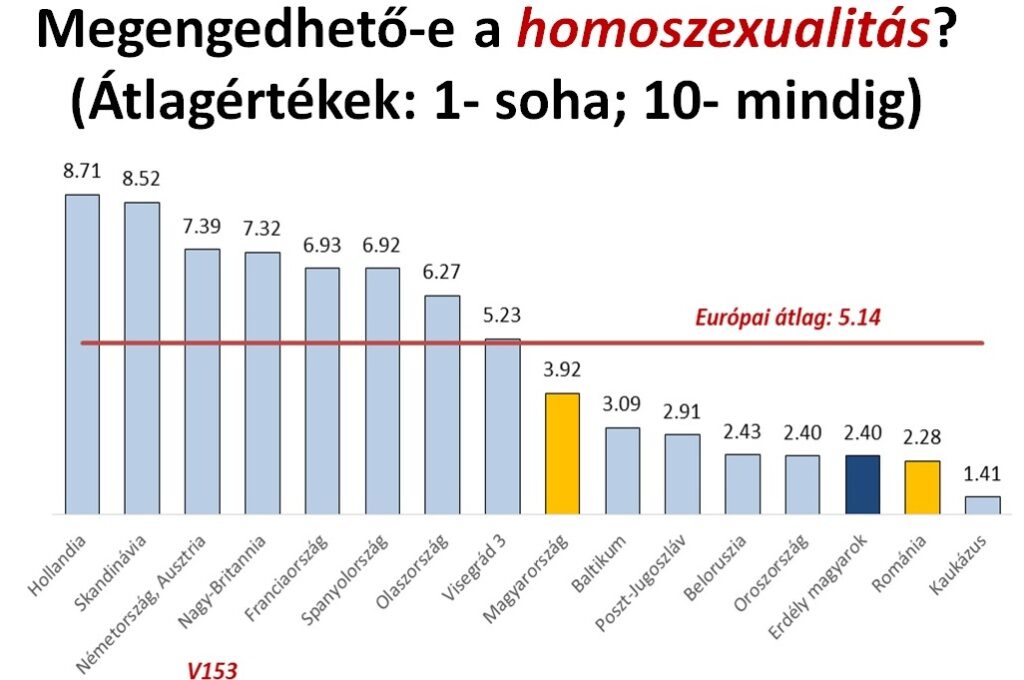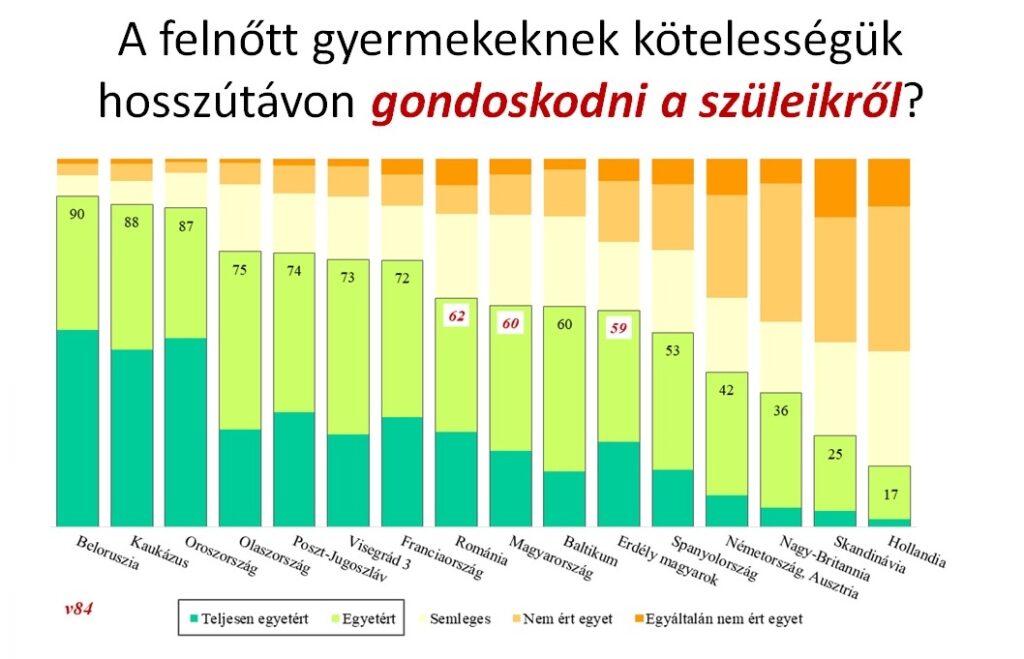In terms of family, gender roles and religious practice, the values of Hungarians living in Transylvania are closer to the values of the Romanians than to those of Hungarians living in Hungary, according to a survey entitled “Hungarians from Transylvania on the European Value Map.” The first part of the results, focusing on the abovementioned topics, were presented by researchers at the Romanian Institute for Research on National Minorities – István Horváth, the director of the institute, and sociologists Tamás Kiss and Dénes Kiss – at a press conference held in Kolozsvár (Cluj-Napoca) on October 13, reports maszol.ro, a Hungarian news portal in Romania.
As the researchers said, this survey is part of the Europen Values Study (EVS), a large-scale, cross-national, repeated survey on basic human values, which provides insights into the ideas, beliefs, preferences, attitudes, values and opinions of citizens all over Europe. The newest EVS study was conducted in 42 countries and included, for the first time, national minorities as well, like the Swedish people living in Finland or the Transylvanian Hungarians. One of the most important aspects of the study was to compare the values of national majorities and minorities and see the differences or similarities in the examined topics, the researchers stressed.
Sociologist Tamás Kiss said at the press conference that there are no significant differences between the values of the ethnic majority and minority regarding family and gender roles. Family-related values were measured in four dimensions: liberalism in private life, family responsibilities, gender roles in the private and public sectors. These were broken down into questions, like how accepted is homosexuality, abortion or divorce; how much people considered childbearing to be a social expectation; or how much they felt obliged to take care of their elderly parents, etc.
Regarding the attitudes toward homosexuality, abortion and divorce, there is a significant difference between Western Europe and the Eastern, post-socialist countries, including Hungarians from Romania, the study shows. Moreover, liberalism in private life is not very relevant for this minority, as Transylvanian Hungarians are more conservative. In Romania, since 1990, the acceptance of abortion has been in decline, as Romanians don’t think that the acceptance of abortion or homosexuality contributes to development, Tamás Kiss pointed out.
On a scale of one to ten, Hungarians living in Romania rated the acceptance of homosexuality a 2.4; abortion, a 3.5; and divorce, a 4.7. The values of Romanians are quite similar, but the Hungarian data differ significantly. Regarding liberalism in private life, 60 percent of Transylvanian Hungarians are conservative, and only 9 percent are liberal. The same applies to the Romanians – 8 percent liberal, 57 percent conservative. But these values are not valid in Hungary, as 20 percent of Hungarians are believers in liberalism of one’s private life and 42 percent are considered conservative.

The survey also analyzed how much people feel obliged to have children and take care of their parents. For this topic, there is also a significant difference between Western and Eastern Europe, but the values of Transylvanian Hungarians are closer to those living in Hungary. Overall, 36 percent of Hungarians in Transylvania, 37 percent of Romanians and 31 percent of Hungarians living in Hungary have a strong sense of family responsibility, compared to only 2 percent in the Netherlands and 9 percent in Great Britain.
Regarding gender roles, Tamás Kiss pointed out that Transylvanian Hungarians are very divided: They consider traditional gender roles important in private life, but not in the public sphere. As the sociologist said, 68 percent of the analyzed group thought that women prefer to stay home and take care of the children, while 52 percent considered that it’s a man’s job to make money. In Romania, these proportions are 65 and 45 percent, and in Hungary, only 49 and 44 percent. The researcher stressed that this opinion is more specific to men, and it is not common among the younger generation, especially younger women. Kiss also mentioned that Partium, not Szeklerland, is the more traditional region.
The survey also shows that 44 percent of Transylvanian Hungarians prefer male politicians and think that men are better leaders than women. According to Tamás Kiss, this mentality is more specific to the post-Soviet countries; in Russia, this value is 63 percent; in Hungary, 33; and in Romani 40.
Transylvanian Hungarians, the most religious people in Europe
Dénes Kiss presented the results about people’s religiousness at the press conference. As an introduction, the sociologist pointed out that until the beginning of the 2000s, religiousness experienced an upswing, but since then, it hasn’t changed. There are many reasons for this, like how churches became more involved in the civil sphere, or how the number of temples doubled since the 1990s, or that the Hungarian historical churches have also appeared in institutions where they were not present before, such as hospitals and prisons.

According to the study, Romania is the most religious country in Europe, well ahead of Italy and Spain, but, according to the research, the religiousness of Hungarians in Transylvania is stronger than the religiousness of Romanians. The study shows that 34 percent of Hungarians from Transylvania attend a religious service once a week, and 83 percent of them pray outside of mass at least once a week or even more often – compared to 81 percent of Romanians or 34 percent of Hungarians in Hungary. As the study shows, 89 percent of the minority consider themselves to be religious people (in Romania, only 85 percent, and in Hungary, 56), 97 percent of them believe in God (the same amount of Romanians believe in God, but only 71 percent of Hungary’s population), and 69 percent of them think that there is life after death (Romania 63, Hungary 46).
According to the researcher, in contrast to Western secularization, Romanians and Hungarians living in Romania are characterized by religious revitalization.
István Horváth said at the press conference that there is a significant fault line between the northwestern and the eastern part of Europe, mostly in terms of acceptance of gender roles and the liberalism of private life. On one side of the scale are countries like Sweden and the Netherlands, where liberalism is very high, and on the other side, there are the Eastern European countries. But within these latter, there is a huge difference between the predominantly Orthodox and the predominantly Catholic or Protestant states. Romania has a very low value in terms of liberalism in people’s private life, and support for gender equality is also low.
“There is no significant difference between the average values of Romanians and of Transylvanian Hungarians. The only dimension, where there is a significant difference is in terms of discrimination of women in the labor market, where Hungarians are more likely to reject this than Romanians,” István Horváth explained.
Title image: Several thousand Hungarians attend the Pentecostal Pilgrimage in Csíksomlyó/Șumuleu every year.